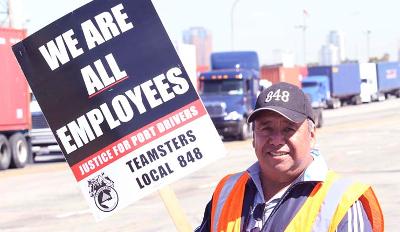
As shoppers prepare for Black Friday, Walmart, Costco, Target and many other retailers are still grappling with the presence of forced labor in their supply chain. This time it’s not in distant sweatshops, however, but right here in U.S. ports. It turns out that these retailers rely on port truckers to transport their goods from container ships and many of those truckers are trapped in debt bondage – with some cases fitting the International Labour Organization’s definition of forced labor. A legislative initiative launched last month aims to analyze how to identify and prevent debt bondage and other abuses in this industry.
Starting in June, an investigative journalist at USA Today posted a ground-breaking series of stories about the port trucking industry in southern California, where truckers’ wages and hours frequently run far afoul of the most basic US labor laws. Every year, these port truckers move $450 billion worth of goods between ships, warehouses and rail yards. Yet many port truckers find themselves trapped in unethical truck leasing agreements that leave them earning as little as $3 an hour, well below the U.S. federal minimum wage of $7.25, despite working 50-plus hours per week.
While predatory lending may immediately bring to mind credit card companies and mortgage scams, in this case it’s used to create a system of debt bondage that binds drivers to abusive port trucking companies. In order to get hired, trucking companies require drivers to lease or rent a truck financed by the company and sign “independent contractor” agreements, but in reality drivers are controlled as employees. The truck lease agreements often extend for seven years and end with a balloon payment that drivers must refinance for another three to five years. The weekly lease payments often include high interest rates and unconscionable fees and are deducted directly from drivers’ paychecks. If the truck breaks down, or the driver gets sick or misses a payment, their truck can be seized and rented to someone else. When this happens, they never again see the equity they paid into the truck. In this way, the truck drivers are forced to continue working excessive hours for subsistence wages making payments on a truck that they are likely to never own. Other predatory leases are simply weekly or monthly “rental” agreements, meaning the companies present no illusion that drivers will ever own the truck.
For drivers who have managed to overcome the odds and make all the truck lease payments, the skyrocket maintenance costs of 8 or 10 year old trucks replace the lease payments. But now if the truck breaks down, the driver cannot work.
The crushing debt pushes many port truckers to frequently exceed the legal limit of driving 11 hours a day. It’s not surprising that hundreds of truckers are getting into accidents every year, with USA Today reporting 20 fatalities between 2013 and 2015 from their analysis of federal crash and port trade data.
Although the trucking companies are mostly unknown to consumers, they are essential service providers to well-known brands and retailers. After reviewing hundreds of thousands of import records, USA Today confirmed, “If you’ve bought anything from Walmart, Amazon, JCPenney, or any other store at the mall, there’s a good chance it started its trip across the U.S. with the port truckers around Los Angeles.” Still, major brands deny responsibility for anything that happens before products reach their retail locations.
Ironically, these and other global brands have invested millions to monitor workers’ rights in their global supply chains, while in the U.S. they rely on the Department of Labor rather than conducting their own diligence. Yet USA Today reports that those same retailers are resisting legal measures that would protect port truck workers from these severe abuses: “Walmart, Target and dozens of other Fortune 500 companies have paid lobbyists up to $12.6 million to fight bills that would have held companies liable or given drivers a minimum wage and other protections that most U.S. workers already enjoy.”
Fortunately, some lawmakers are moving ahead nonetheless with the Port Drivers’ Bill of Rights Act of 2017. The bill, sponsored by Rep. Grace Napolitano and seven other House Democrats, is intended to create basic standards of work for port truckers, including fair wages, protection under labor laws, and freedom from “exploitative truck lease or rental arrangements.” At a press conference introducing the bill, port truck drivers from both coasts came together outside of the Capitol in Washington, D.C. to share their experiences and promote legislation to protect their rights. A second bill, the Clean Ports Act, sponsored by Rep. Jerrold Nadler, would empower local port authorities to enact policies to restore justice and dignity to port drivers. For Congresswoman Nanette Barragán, one of the bill’s sponsors, this issue goes deeper than just the government’s responsibility: “My cousin is a truck driver. I’ve sat down to look at his statements, to try to understand how he brought home so little money after so much work.” After charges for the lease, registration, gas and insurance, driver paychecks can be pennies or even reflect money owed to the company.
This new legislation comes at a crucial time. Currently, the only recourse workers have is to file complaints with the California Department of Industrial Relations. But even though a large number of lawsuits against trucking companies are decided in the worker’s favor – judges have sided with drivers in 97% of cases heard – the lack of an effective enforcement mechanism allows the companies to hide their assets and avoid ever paying the required judgement. As Teamsters’ International Vice President Fred Potter remarked during the press conference introducing the bill, “Ports are an economic engine for the country and the regions they serve – but not for port truck drivers.”


